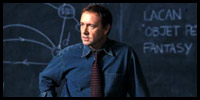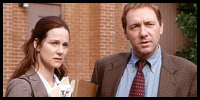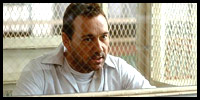
 |
The Life of David Gale (2003) Directed by Alan Parker Cast: Kevin Spacey, Kate Winslet, Laura Linney, Gabriel Mann, Matt Craven, Rhona Mitra, Leon Rippy, Melissa McCarthy, Jim Beaver, Elizabeth Gast, Cleo King 2003 – 130 minutes Rated: Reviewed by Dustin Putman, February 22, 2003.  A film that is strongly against the subject of capital punishment, "The Life of David Gale" runs a fine line between stating its case and coming off as a sermon. The line, however, is never completely crossed, resulting in a riveting mystery-drama filled with absorbing writing and even better acting. And for those critics who have violently criticized the picture for having an ulterior motive have missed the point altogether. Director Alan Parker (1999's "Angela's Ashes") and screenwriter Charles Randolph hold a definite negative opinion concerning capital punishment, but they have wisely chosen to provide a solid case against it rather than taking the low road of downright preaching. Viewers are left to walk away with their own thoughts and feelings on the matter, based on what they know and what they have just seen, which is more than can be said about most of 2003's releases, thus far.
A film that is strongly against the subject of capital punishment, "The Life of David Gale" runs a fine line between stating its case and coming off as a sermon. The line, however, is never completely crossed, resulting in a riveting mystery-drama filled with absorbing writing and even better acting. And for those critics who have violently criticized the picture for having an ulterior motive have missed the point altogether. Director Alan Parker (1999's "Angela's Ashes") and screenwriter Charles Randolph hold a definite negative opinion concerning capital punishment, but they have wisely chosen to provide a solid case against it rather than taking the low road of downright preaching. Viewers are left to walk away with their own thoughts and feelings on the matter, based on what they know and what they have just seen, which is more than can be said about most of 2003's releases, thus far.
 David Gale (Kevin Spacey), a former college professor, has found his life the source of great irony. A man strongly against capital punishment, he now sits on death row in Texas for the murder and rape of fellow activist Constance Hallaway (Laura Linney), crimes he claims he did not commit. With only four days remaining until his execution, he has organized a 6-hour, 3-day interview with strong-willed reporter Bitsey Bloom (Kate Winslet) in an attempt to get his side of the story heard. Bitsey, who walks onto the assignment with equal parts skepticism and disdain, soon finds herself believing in David's claims of innocence as he recounts his tragic tale to her.
David Gale (Kevin Spacey), a former college professor, has found his life the source of great irony. A man strongly against capital punishment, he now sits on death row in Texas for the murder and rape of fellow activist Constance Hallaway (Laura Linney), crimes he claims he did not commit. With only four days remaining until his execution, he has organized a 6-hour, 3-day interview with strong-willed reporter Bitsey Bloom (Kate Winslet) in an attempt to get his side of the story heard. Bitsey, who walks onto the assignment with equal parts skepticism and disdain, soon finds herself believing in David's claims of innocence as he recounts his tragic tale to her.
 "The Life of David Gale" works on two levels. For one, it is an engrossing thriller that manages to fully hold one's interest for the duration of its 130-minute running time. And two, it states a bold and rather believable case about why capital punishment is not always the answer in murder cases. Whether one wants to believe so or not, there is no doubt that people have been executed who were, indeed, innocent of the heinous crimes they were charged of. And even if they are guilty, one must question whether a criminal's execution can ever truly bring closure or peace to the victim's loved ones.
"The Life of David Gale" works on two levels. For one, it is an engrossing thriller that manages to fully hold one's interest for the duration of its 130-minute running time. And two, it states a bold and rather believable case about why capital punishment is not always the answer in murder cases. Whether one wants to believe so or not, there is no doubt that people have been executed who were, indeed, innocent of the heinous crimes they were charged of. And even if they are guilty, one must question whether a criminal's execution can ever truly bring closure or peace to the victim's loved ones.
 David's story, told in extended flashbacks, is a poignant one. A loving father and successful teacher, a moment of careless and consensual sex with a student led to false claims of rape. Despite getting the charges dropped, he finds himself losing his job and beloved family because of it, leading him on a downward spiral with alcohol. David's one source of hope through the ordeal is good friend and colleague Constance, a somewhat homely woman who nonetheless is undeterred in her battle against capital punishment. The who's, how's, and why's of Constance's death are a mystery that hangs over the proceedings with a sense of dread and hopelessness. Even if there is evidence out there that proves David's innocence, will Bitsey believably be able to find it within 24 hours when David's defense couldn't find it throughout his trial?
David's story, told in extended flashbacks, is a poignant one. A loving father and successful teacher, a moment of careless and consensual sex with a student led to false claims of rape. Despite getting the charges dropped, he finds himself losing his job and beloved family because of it, leading him on a downward spiral with alcohol. David's one source of hope through the ordeal is good friend and colleague Constance, a somewhat homely woman who nonetheless is undeterred in her battle against capital punishment. The who's, how's, and why's of Constance's death are a mystery that hangs over the proceedings with a sense of dread and hopelessness. Even if there is evidence out there that proves David's innocence, will Bitsey believably be able to find it within 24 hours when David's defense couldn't find it throughout his trial?
 The cast is superlative, a real highlight in a still thought-provoking film. Kevin Spacey, in the best role he has had since his Oscar-winning performance in 1999's "American Beauty," brings a warmth and compassion to David Gale, even as he refuses to shy away from uncovering his character's flaws and mistakes. Kate Winslet, who has kept a surprisingly low profile since 1997's "Titanic," is thoroughly captivating as Bitsey Bloom. One interesting thing to note is that this is Winslet's first-ever modern-day part, and it is refreshing to finally see her in jeans and shirts rather than corsets. As the ill-fated, good-hearted Constance, Laura Linney (2002's "The Mothman Prophecies") is touching in a courageous role that calls for her to be involved in some pretty disturbing situations. Lending fine support are Gabriel Mann (2002's "Abandon") as reporter intern Zack, who tags along with Bitsey and helps her out in her investigation, and Melissa McCarthy (2002's "Pumpkin") as Nico, a goth chick who now lives at the scene of the crime and runs a museum/tour for those interested in seeing where Constance's death took place.
The cast is superlative, a real highlight in a still thought-provoking film. Kevin Spacey, in the best role he has had since his Oscar-winning performance in 1999's "American Beauty," brings a warmth and compassion to David Gale, even as he refuses to shy away from uncovering his character's flaws and mistakes. Kate Winslet, who has kept a surprisingly low profile since 1997's "Titanic," is thoroughly captivating as Bitsey Bloom. One interesting thing to note is that this is Winslet's first-ever modern-day part, and it is refreshing to finally see her in jeans and shirts rather than corsets. As the ill-fated, good-hearted Constance, Laura Linney (2002's "The Mothman Prophecies") is touching in a courageous role that calls for her to be involved in some pretty disturbing situations. Lending fine support are Gabriel Mann (2002's "Abandon") as reporter intern Zack, who tags along with Bitsey and helps her out in her investigation, and Melissa McCarthy (2002's "Pumpkin") as Nico, a goth chick who now lives at the scene of the crime and runs a museum/tour for those interested in seeing where Constance's death took place.
 "The Life of David Gale" is not always air-tight in some of its plot developments, and a running subplot involving a mysterious cowboy who is following Bitsey is too obvious and distracting. These minor missteps are a small price to pay, however, for a film whose cumulative effect is powerful, to say the least. The cinematography by Michael Seresin (2001's "Domestic Disturbance") should also be noted, pulsating to life and taking advantage of both the desolate and bustling landscapes Texas has to offer. With "The Life of David Gale," director Alan Parker has concocted a well-made, smart dramatic thriller, and a fair indictment against the death penalty for viewers willing to open their minds.
"The Life of David Gale" is not always air-tight in some of its plot developments, and a running subplot involving a mysterious cowboy who is following Bitsey is too obvious and distracting. These minor missteps are a small price to pay, however, for a film whose cumulative effect is powerful, to say the least. The cinematography by Michael Seresin (2001's "Domestic Disturbance") should also be noted, pulsating to life and taking advantage of both the desolate and bustling landscapes Texas has to offer. With "The Life of David Gale," director Alan Parker has concocted a well-made, smart dramatic thriller, and a fair indictment against the death penalty for viewers willing to open their minds.
|
© 2003 by Dustin Putman |













